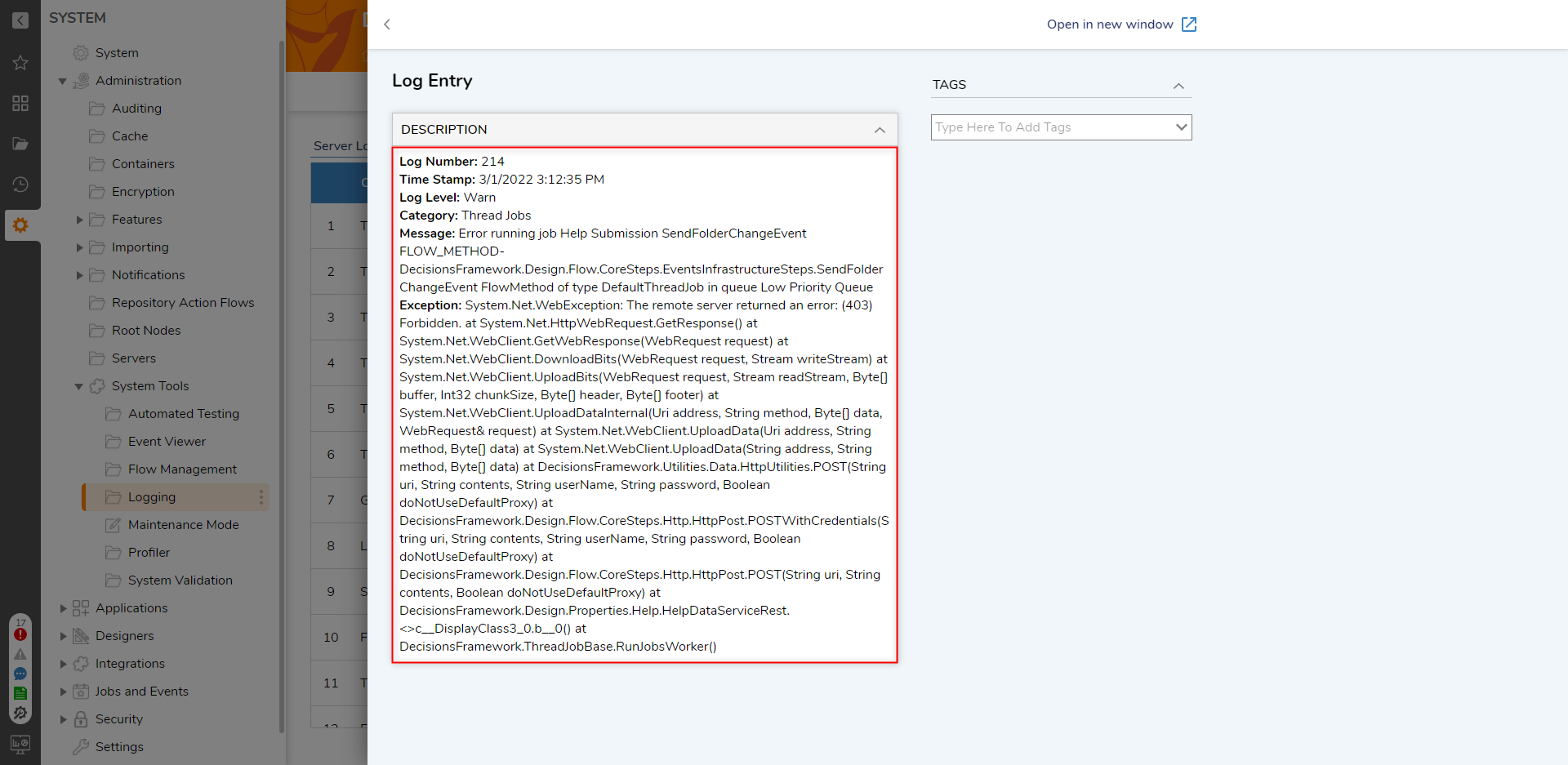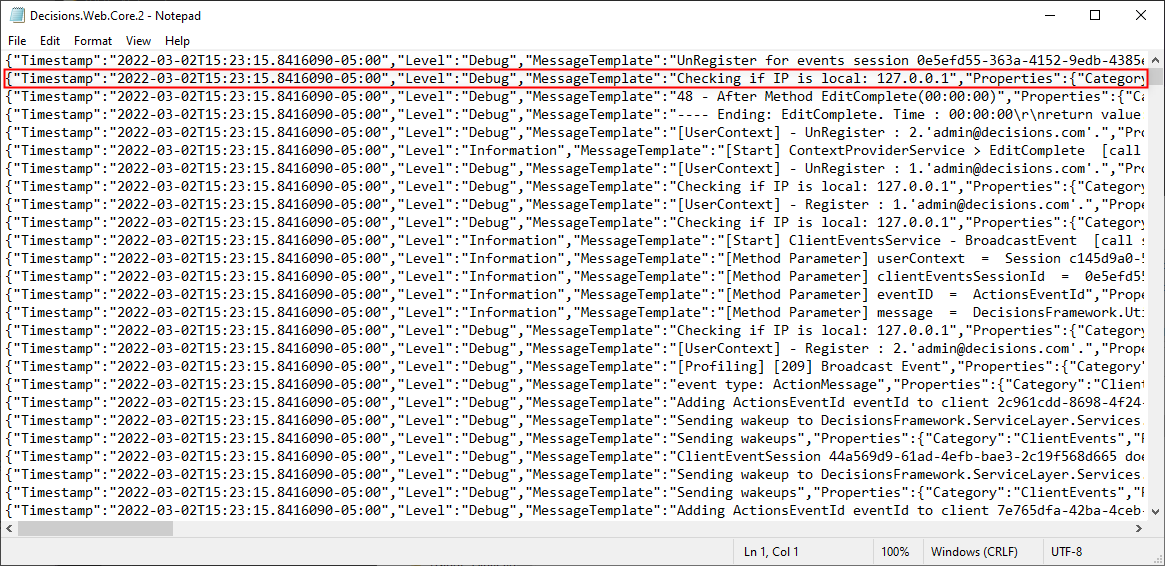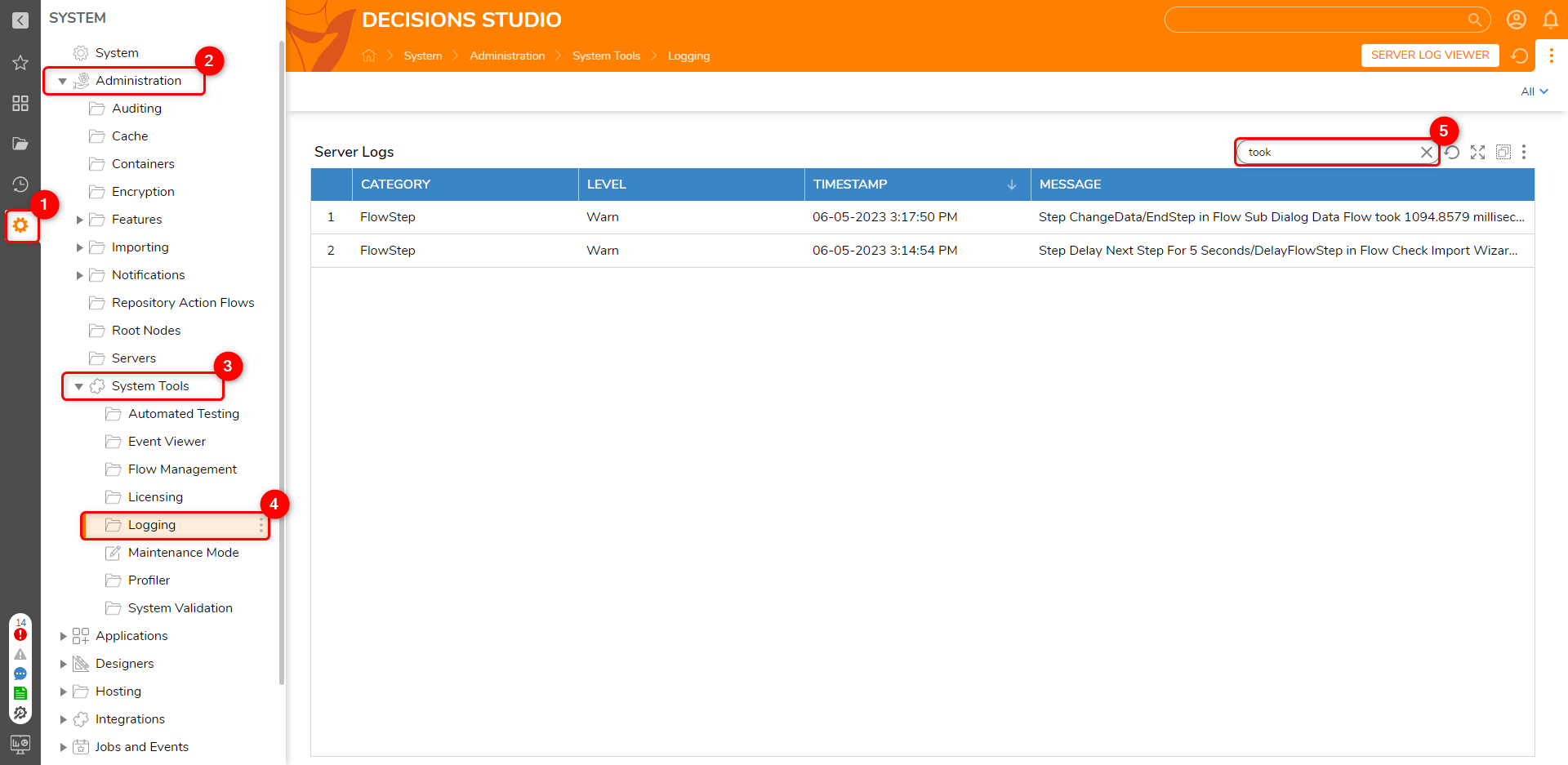Logs are records of events throughout the environment, often used as a reference for troubleshooting issues.
It is important to note that log messages consist of various components that require some knowledge to interpret them effectively. This article aims to provide guidance on reading and comprehending log messages, empowering end users to effectively utilize the information contained within the logs.
Log Levels
Log Levels declare the level of importance and severity of the error described in the log. The following default types are as follows:
| Type Name | Description |
|---|---|
| Info | This provides information to the user on an occurrence and is typically used outside of error tracking. |
| Debug | This catches most exceptions that do not fall under the other categories. |
| Warn | This tracks potential issues that do not impede the process from running. These are typically less critical issues. |
| Error | This tracks when a process cannot complete properly. |
| Fatal | This is an environment-breaking level warning that stops a process (or multiple processes) from running. |
Log Composition
The following section details the individual parts of a log as well as their respective functions.
| Log Section Name | Description |
|---|---|
| Log Number | The unique GUID is assigned to a Log. It allows users to reference a particular Log message quickly. |
| Time Stamp | This shows the time and date when the error occurred. |
| Log Level | By default, Decisions generate Logs with five distinct levels; Warn, Info, Debug, Error, and Fatal. These levels help to indicate the severity of an issue. |
| Category | This identifies which tool or part of Decisions is generating the issue. This is extremely helpful if the administrator is unsure of the origin of the issue. Example categories may involve Rule Engine, Server, System, Security, AbstractDebugEntity, API Profiling, FlowStep, Database, and more. |
| Message | This shows the message for the error that occurred, stating what would appear for the error message in the Decisions environment if the problem were encountered there. |
| Thread Id | This shows which thread the Log occurred on. Threads are used to trace the execution of a series of Log events, although it cannot be inferred that previous Log messages in the film occur in the same execution context. |
| CallTrackingID | If the error involves an API call, it captures the ID of the call that produced the log. |
| ClientSessionID | Captures the Client Session ID of the user when the issue occurs. |
| Session ID | This shows the Session ID for the user session where this issue occurred. |
| Exception Details | This shows the exception message for the error that occurred, providing precise details of what happened when the occurrence was triggered. |
Log components displayed vertically:
Log components displayed horizontally:
Performance Logs
Admin users have the ability to configure various logging parameters in Settings.xml that includes API calls timing, SQL timing, Flow Steps timing, etc.
Once configured in settings.xml, navigate to System > Administration > System Tools > Logging. This will display a comprehensive Report of server logs. Above the Report viewer, in the search bar, search for the keyword 'took'. This will filter and display logs that indicate actions or processes that took a specific amount of time. By analyzing these logs, you can gain insights into potential performance bottlenecks or areas for improvement.

Server Log Categories
The following list of Server Log Categories is pre-built into every Decisions instance:
| Log Category Name | Description |
|---|---|
| Job Schedule Worker | Logging related to Scheduled Jobs. |
| Flow Engine | Logging related to information on the Flow Engine. |
| DecimalTypeConverter | Logging related to Decimal type converter flows. |
| Service Layer | Logging related to the Service Layer of the ORM. |
| DateTimeArrayEditorAttribute | Logging related to the DateTime display format. |
| CssService | Logging related to CSS Documents |
| Folder | Logging related to Folders within the studio. Includes actions and subfolders retrieved. |
| TypeExtensions | Logging information for extensions method for System.Type |
| Forms | Logging related to Form issues. |
| Service Layer (OData) | Logging related to getting the related data from associated types. |
| Reports | Logging related to information on reports that have been run |
| ClientEvents | Logging related to events based on the session. |
| Cluster | Logging related to information on servers in a cluster. |
| DoubleConnectionStringConnection | Logging related to information on having a dual connection string setup |
| Rule Engine | Logging related to information on the Rule Engine. |
| Document | Logging related to imported documents. |
| Actions | Logging related to user actions. |
| Page | Logging related to pages. |
| RepositoryProxyHelper | Logging related to connecting to a Repository when looking for revisions. |
| License Policy | Logging related to information on licenses level and what they provide - i.e., Personal Licenses not allowing remote connections. |
| CodeBucketHelper | Logging related to errors when compiling generated code. |
| AuditService | Logging related to information on the audit listener. |
| ORM | Logging related to the ORM Layer process. |
| AppStoreHelper | Logging related to the Decisions Appstore endpoint. |
| General | Logging on starting sessions |
| ProcessorUtilities | Logging regarding the Windows Server information. |
| Data Utilities | Logging related to data objects. |
| ProfilerService | Logging related to the Profiler. |
| Thread Jobs | Logging information on for Thread Jobs. |
| ReportHelper | Logging information on Report changes. |
| BootInitialization | Logging related to information when the system starts up. |
| LogCallEndAttribute | Logging information on the end of calling a process. Shows the total time |
| Account | Logging related to Account information |
| RemoteRepositoryService | Logging related to information on communication with a repository |
| JobSchedule | Logging related to job schedule settings |
| InstanceData | Logging related to an instance of a multi-tenant server. |
| ModuleResource | Logging related to ModuleResource type. |
| TypeUtilities | Logging related to information on datatype assemblies. |
| Configuration Storage | Logging related to configuration data. |
| Entities | Logging related to Entities |
| FlowStep | Logging related to Flow steps that ran over the time set in the settings.xml file |
| Agent | Logging information on agent-related items |
| Server | Logging information on the service host manager and port binding |
| CreateData | Logging information on the create data step |
| Unit Tests | Logging information on Unit Tests. |
| AOP | Information about everything that happens within the portal. If this is on, it will bloat the logging section. |
| Security | Information on the current user context and verifying that the IP is local |
| ObjectsImporter | Logging related to code buckets not compiling during the import process. |
| ApiThreadCleaner | Logging related to cleaning up API threads. |
| Rule | Logging related to the rule designer. |
| API Profiling | Logging related to API Call information |
| System | Logging information related to system startup |
| Database | Logging related to the database connection and loading tables. |
| Decisions.Core | Logging related to the Decisions.Core module |